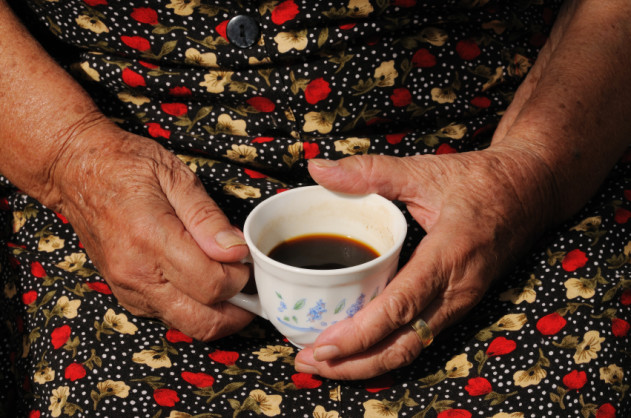My mother is fading before my eyes.
The coffee was just the latest.
First she stopped driving, then she stopped stocking the fridge for family visits, then she stopped cooking at all. We let each transition pass quietly, stepping in to shoulder a weight she couldn’t manage anymore. She gave her car to my niece, turning the loss of her independence into a gift; my siblings and I started buying groceries for our visits; our father learned to cook dinner. She kept quiet at family gatherings, but with 12 people filling the house with their conversations, who even noticed?
But coffee has always been Mom’s particular thing. She likes it scalding hot. I remember when we got our first microwave, her delight in heating the milk before pouring in the hot coffee; often she would even pause halfway through the cup to reheat it. It seemed impossibly adult (though when I grew to coffee drinking age, I realized—as I did with many things—it wasn’t adult; it was just Mom).
Working full-time now that her four kids were well launched in school, Mom needed her morning cup of coffee. I can still see her standing in our kitchen, dressed professionally in her skirt suit and flowered blouse, taking sips from her pottery mug while also packing her briefcase and listening to the morning traffic report on the radio.
When she and my dad moved into an assisted living apartment near my house last year, it was important to stock it with coffee supplies: bean grinder, drip machine, filters, and of course a microwave to warm the milk. I bought little versions of everything for her to brew a single cup.
The busy working mother who really needed that coffee is long gone, packed up with the rest of the house. I saw her in files full of meeting notes, budgets, and awards from her long career in healthcare; in detailed itineraries and correspondence from her later career as a travel agent and tour guide. I packed up a younger woman, too: a college girl I discovered via her yearbooks and scrapbooks, thick with clippings from choral performances, football game programs, and pressed corsages from long-forgotten beaux. I sat and pondered those remnants, bookends to the life of the woman I know best, the one who spent so many years fully immersed in the daily life of her four children. I packed it all into boxes and drove them to the recycling center.
I winnowed down my parents’ 5-bedroom house, sorted books and dishes and furniture, and brought just a sampling to San Francisco. I hung pictures and tailored the old curtains to fit in the new windows.
“It looks like home,” they said when they walked in and I sighed with relief, knowing it would take time before it felt like home.
The cup of coffee is a morning ritual, a comforting and familiar way to start the day. She’s switched to decaf, just a splash topped with the hot milk, but she still wants it scalding. She still wants it, period.
She liked the new coffee supplies, but there were some glitches. She put whole beans in the filter one morning; another time, she put beans in the coffee maker without a filter at all. I took the grinder away and bought her ground coffee. Then one day she called and asked me to pick something up from the grocery store.
“Sure, what do you need?” I asked, distracted, looking for my grocery list.
“Something for breakfast…” she started, her sentence trailing off.
“OK,” I prompted. “Something you eat? English muffins?”
“No…”
“Jam?”
She had my full attention now, but was my game of 20 Questions helpful or annoying? I waited, willing an answer to come to her. Silence.
“Mom? Do you want to go look in the kitchen to see if you remember?”
A beat. Then, “Coffee!”
Coffee still tastes good despite a daily cocktail of medications which distort her taste buds and dull her hunger; I just wish it were more filling. She stands in front of the mirror, frowning at her reflection, at the way her slacks pucker under her tight belt.
“All my clothes are getting too big,” she murmurs. I offer to take her shopping. She holds out her thin arm and shows me how her watch dangles like a bracelet. I take it to the Russian jeweler who takes a link out of the band. She is fading before my eyes.
My dad, a lifelong tea drinker, wants her to teach him how to make coffee, then he suggests she teach me. But coffee making has long been a muscle memory for her; she could no sooner teach us the steps than grow the beans herself. So my husband, who has been pulling cappuccinos since he was tall enough to reach his parents’ machine, steps in: He can brew her a weekly carafe to keep in the fridge. Now she warms milk and coffee together.
Every week, every month, a little bit more fades away and I step closer to fill the gap: I finish her sentences; I take her arm as we walk down the hall; I bring her the coffee. As we shift roles, as I mother more than daughter, I sense my shadow falling over her. So I remind myself to move back, to keep quiet, and to get to know the woman who is still here.
Caroline M. Grant is the associate director of the Sustainable Arts Foundation and co-editor of the anthology The Cassoulet Saved Our Marriage: True Stories of Food, Family, and How We Learn to Eat. She lives in San Francisco with her husband and two sons.
This originally appeared on The Monthly. Republished here with permission.
Related Links:

